How Alexander the Blessed rewarded
Russia at that time had two such nimble neighbors: Turkey and Sweden. With the Ottoman Empire since 1806, a sluggish war was waged, which should be stopped as soon as possible, and best of all not by diplomatic, but by force, in order to discourage the waiter to swing the scimitar for a long time. Nikolai Kamensky coped well with the last task until his unexpected death (they said that this general was poisoned), but in the end he had to hurry, so Mikhail Golenishchev-Kutuzov, who replaced Kamensky, did not have the honor to hang a shield on the gates of ancient Tsargrad. Instead, our great strategist obtyap (no other word) surprised the whole world in May, 1812, i.e. on the eve of World War II, Bucharest Peace Agreement. According to it, Russia and Turkey, having made minor concessions, in fact, remained in their previous positions. All, however, it was clear what advantage the Russians had gained: the whole army freed up from them for action in the western direction.
With Sweden, things were different. In St. Petersburg, many more remembered the 1788 – 1790 war, unexpectedly unleashed by the half-crazed romantic king Gustav III. Then the cannonade of the Krasnogorsk sea battle was heard already in Tsarskoye Selo. And who could guarantee that in the event of a new battle with Napoleon, the Swedes would not want to take advantage of the temporary weakness of the Russians in the Baltic?
True, the situation in the Baltic kingdom itself was now somewhat different than twenty years before. Gustav IV, formally the son of Gustav III, sat on the throne, and in essence, his wife and his chief master Adolf Munch, as the romantic king was not interested in the weak sex. Another Gustav, as well as the previous one, was considered “our man” in Stockholm. And this time it is not unreasonable: the king really was largely pro-Russian, and he apparently chose Paul I with his ideal of discipline and training as a role model.
Catherine II even wanted to arrange the personal life of the young king, for which he was summoned to North Palmyra, accompanied by an uncle regent. Gustav would perhaps not mind sharing the marriage bed with Catherine's granddaughter, but this pedant flatly refused to give the future spouse the opportunity to freely practice the Orthodox faith, which the Swedish Constitution directly prohibited. As a result, the lawyer sent back home. But they didn’t spoil relations with him and in the future they always relied on his meticulous loyalty.
Gustav, following in the wake of Russian politics, quarreled with England under Paul I and with France under Alexander I. In 1806, Swedish troops even landed in Pomerania and took part in battles with the Prussians. Although the royal army has long been a pale shadow of the mighty power that made Europe tremble in the Thirty Years War, and Russia - in the Northern War, before Poltava. Not surprisingly, the Swedes were soon defeated. Here they had to get acquainted with Napoleon's marshal Jean-Baptiste Bernadot, the Gascon and d'Artagnan of his time. The consequences of this acquaintance that are important for Sweden will have an effect later, but for now the marshal showed a shrewd humanity - he took care of the captured Scandinavians in such a way that he charmed with his personality all of their severe northern homeland.
Perhaps only King Gustav was not subject to sentimentality. Despite the military weakness of his country, he remained the mortal enemy of Bonapartism. And in 1807, having learned about the conclusion by the Russians of the treacherous, in his opinion, peace, he indignantly sent back the signs of the Orders of St. Andrew and St. Alexander Nevsky belonging to him as a gentleman.
By agreement with Napoleon, Emperor Alexander I was now forced to compel the Swedes to make peace with the French, and even force them to join the continental blockade of England, which, of course, fundamentally contradicted Russia's own interests, since Russia in this case deprived itself of the last major ally in the coming collision with uncontrollably, it seemed spreading across the continent by France. But meanwhile, the idea to take at least some benefit from defeat seemed very tempting and, taking advantage of the moment, move the state border away from vulnerable St. Petersburg.
Despite a long negotiations, it was not possible to come to a friendly agreement with Gustav, and in February 1808, without declaring war, Russia began hostilities.
According to the recollection of Philip Wiegel, although biased, but not uninterestingly memoirist of that era, not a single war has provoked so little patriotic frenzy and so much sympathy for the enemy in the Russians. The northern neighbor looked so unmilitary that the majority considered it quite sufficient if the Russian army entered Swedish territory: Gustav’s citizens would surrender at once.
The beginning of the war justified this forecast. The regular Swedish army really did not want to fight seriously. Already at the end of February, the hapless defenders of the well-fortified Sveaborg threw out the white flag. However, in the rear of the advancing Russian troops, the Finnish partisan, who was distinguished by extreme unbridledness, looked up. The Finns flew into separate small Russian units, attacked carts, destroyed everything to the last man. They did not spare either the prisoners or the wounded. Here is what another memoirist, Faddey Bulgarin, wrote about this: “All Finnish villagers are excellent shooters, and in each house there were guns and spears. Strong pedestrian and equestrian crowds were formed, led by pastors, landmen ... and Finnish officers and soldiers ... attacked weak Russian troops, hospitals, and killed unhappily sick and healthy ... The outrage was in full force, and the people's war was in full swing with all their horrors ".
In the spring the Russians got stuck in a lake country. In addition, the Swedes gradually came to their senses and gave an unexpectedly strong rebuff - from Siikajoki, from Revolax and in several other places. Behind them loomed England, pledged to pay 1 million pounds a month, if only Gustav continued the war. It came to the point that the Russian commander-in-chief, General Fyodor (Friedrich Wilhelm) Buxhevden, concluded a temporary truce with the enemy in September, which, however, was not approved in St. Petersburg.
The war continued. A decisive break came at the beginning of the next year, 1809, and it was marked by an unprecedented feat: divided into columns, the Russian corps marched across the ice of the Gulf of Bothnia and for the first time in all history entered the Swedish coast proper. Cossack patrols appeared in the vicinity of Stockholm. The Swedish capital was in panic. On March 13, a coup d'état took place here, as a result of which Gustav IV was deposed and peace negotiations began, ending with the signing of the Treaty of Friedrichs, under which all of Finland was ceded to Russia.
The Russian autocrat began to be called now also the Grand Duke of Finland, and two medals were sold to his soldiers. One of them, "For the transition to the Swedish coast," was presented to the soldiers of the units of General Michael Barclay de Tolly. On the obverse side is the monogram of Alexander I under a large imperial crown. On the back side there is a five-line inscription: “FOR - TRANSITION - ON SWEDISH - BEACH”. Below the figured trim date: "1809". In total, the St. Petersburg Mint minted 5443 pieces of such silver "beckoning".
Another medal, “For the passage to Sweden through Tornio”, established simultaneously with the “Barclayevskaya”, was given to soldiers of the detachment of Count Pavel Shuvalov, who forced a large Swedish detachment from Kaliks. This medal differed from its “sister” only in the inscription on the reverse. To wear it in the same way should be on the blue ribbon of the Order of St. Andrew. "Shuvalov" medals produced more - 6269 pieces.
So, the border from St. Petersburg was pushed back to a safe distance, Gustavsson deprived of the crown under the name of Colonel Gustavsson went to eternal exile, and his uncle, Duke Karl Südermanland, who inherited the last, sat down on the throne that was liberated ... Jean-Baptiste Bernadot Yes, it is the very French marshal. Such was the gratitude of the Swedes for the Gascon philanthropy! Hence the lesson for all of us: do good - it will pay off a hundredfold later.
By the way, unexpectedly having appeared in the 1810 th Swedish crown prince, and then the king, the Frenchman in the future always acted solely in the interests of his new fatherland. With him, who actually ruled the country since his arrival, Sweden in 1812, decisively broke with France and entered into an alliance with Russia. That's it! In the 1813 – 1814 campaigns, Prince Bernadot fought Napoleon with such success that the former Napoleon Marshal was awarded the Russian Order of St. George of the I degree for the battle of Dennewitz in Prussia. And before that, he received what poor Gustav refused, the Order of St. Andrew the First Called.
We will briefly tell you about the other most important medals of the Alexander Age, as the historical events associated with them are widely known.
The 1812 year turned out to be so rich in grandiose blood-lettings that it was considered impractical to coin a medal for everyone, even if it was the Battle of Borodino. Instead, in February of the next 1813, the Imperial Decree issued an award to all participants of the liberation of their native land of the award medal "In memory of the Patriotic War of 1812 of the Year." Here is his remarkable text:
“Warriors! a glorious and memorable year in which you were impudent and roughly impressed and punished to enter your Fatherland as a lyutho and strong enemy into the Fatherland, this glorious year has passed, but your loud deeds and exploits have not passed and will not be silent: you saved your Fatherland with your blood from many of the nations and kingdoms that had joined in against him. You earned gratitude from yours and respect from alien Powers through your labors, patience and wounds. You showed your courage and courage to the light that where God and faith are in the hearts of the people, there at least enemy forces were like Okiyan’s waves, but all of them, like a firm, unshakable mountain, would be scattered and crushed. Out of all their rage and savagery, there will be only one moan and the noise of perdition. Warriors! in commemoration of your unforgettable exploits, we have commanded We knock out and consecrate the silver medal, which with the inscription on it of the past, so memorable 1812 of the year, should decorate your breast with an irresistible shield of the Fatherland on a blue ribbon. All of you are worthy to bear this memorable sign on yourself, this is evidence of works, courage and participation in glory; for you all bore the same weight, and with unanimous courage breathed. You can justly be proud of this sign. He reveals in you God-blessed true sons of the Fatherland. Your enemies, seeing him on your breast, will tremble, knowing that bravery burns beneath him, not based on fear or greed, but on love of faith and the Fatherland and, therefore, nothing invincible. ”
On the obverse of the silver medal there is a “all-seeing eye” in the rays, and under it is the date - “1812 God”. On the reverse side, the Biblical maxim was placed in four lines: “DON'T NAM, - DON'T NAM, - AND NAME IS TO YOUR NAME.” 250 thousand copies of this expressive award were worn by direct participants in the hostilities - from field marshal to private soldier and warrior-militia.
For another year, the medal of the same design, but first made in bronze, was, as stated in the corresponding Manifesto, “our noble nobility ... now expressed unprecedented jealousy with a generous donation of not only property, but also of its own blood and life”. Nobles should carry the award on the red-black ribbon of the Vladimir Order. Not forgotten, and "eminent merchants, who took in the general jealousy and zeal noble participation." Merchants relied the same medal, but on Anninsky tape.
Another sign medal of that glorious time is “For the capture of Paris”. It was established on August 30 1814 of the year in honor of the capture of the French capital by Russian troops 30 in March of the same year. On the obverse - bust image of Alexander I in a laurel wreath under the "all-seeing eye". On the reverse, on the medal around the medal, there is a five-line inscription: "FOR - TAKEN - PARIS - 19 MARCH - 1814". True, the distribution for political reasons (in France, the Bourbon dynasty had just been restored to the throne and did not want to “expose” it to the critics of the unfinished Bonapartists in this way) started 12 years later under the new emperor. Nicholas I ordered to issue more than 160 thousand copies to the surviving veterans, after having consecrated a medal at the tomb of the deceased brother. The medal ribbon is curious: it was double, made up of two order ribbons - St. Andrew and St. George.
"For the capture of Paris" was the last large-scale award medal of the Alexander Age. After it, until the death (at least official) of this king, mostly completely peaceful "manets" were minted, such as the medal "For Distinction", intended mainly for artists, singers or dramatic actors.
A new era was approaching, including in the Russian medal story, the story of which is in our subsequent chapters.
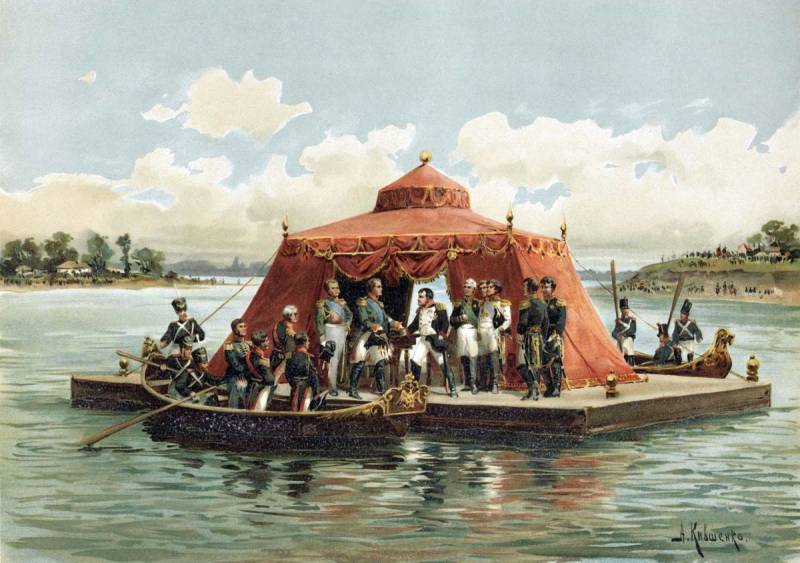
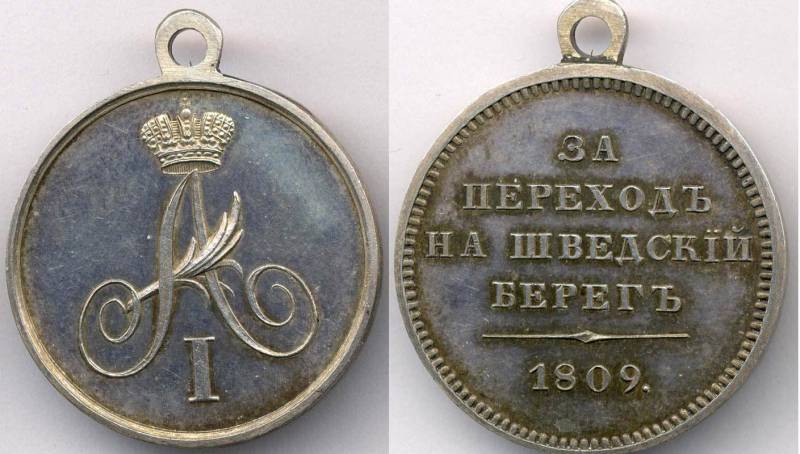
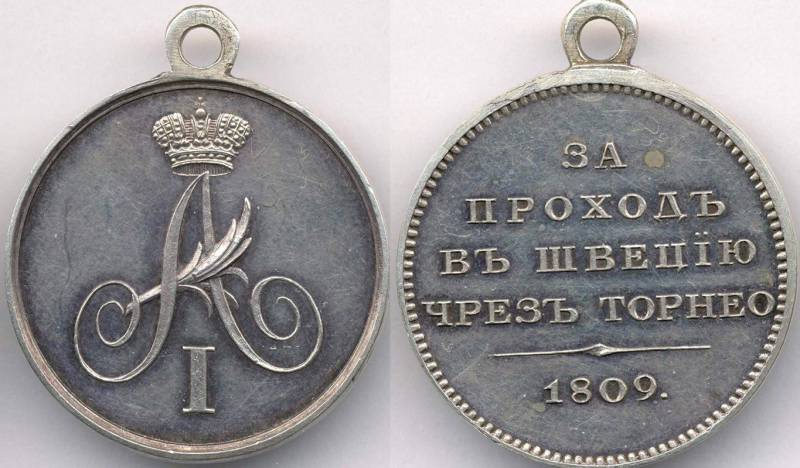
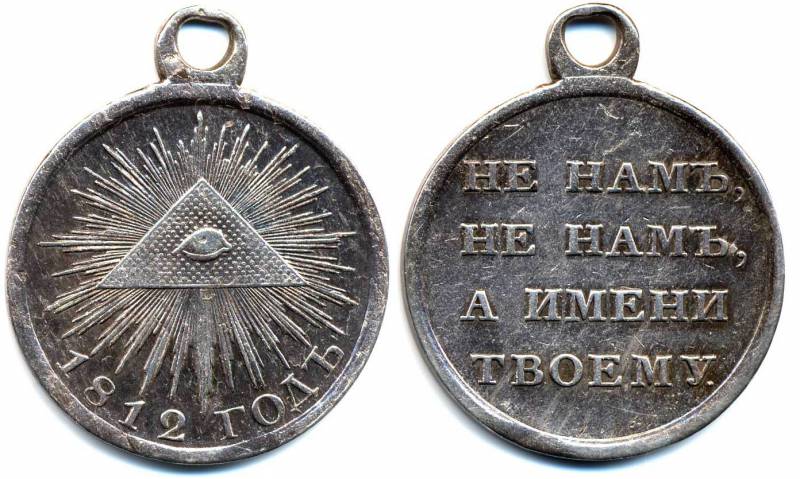
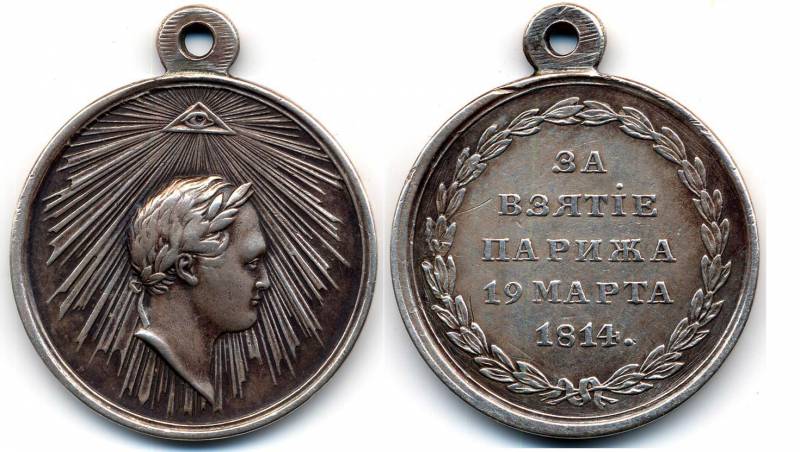
Information